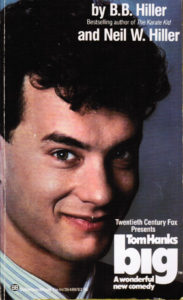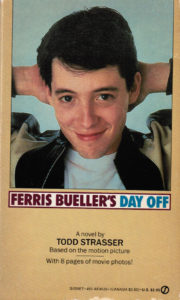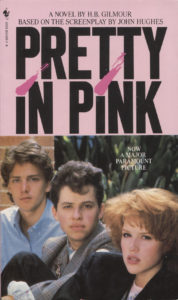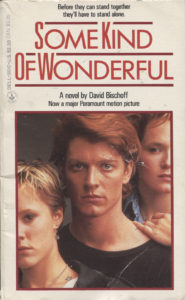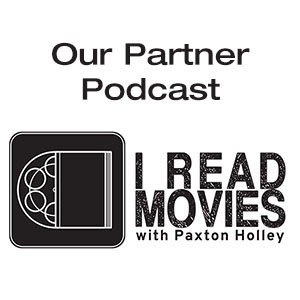When it comes to movie novelizations, becoming a collector can prove to be quite frustrating on many levels. Just finding these adaptations is tough enough, whether it’s locating enough used bookstores in your area that have them in stock, or simply recognizing them in the stack upon stacks of musty yellowing paperbacks. Heck, sometimes just knowing what titles to look for can be daunting in an of itself. It’s not like there is a database of available novelizations (well, there actually is now dear reader, but it’s a work in progress.) Maybe you have a favorite movie that you’d love to find a novelization for, so you hop on the internet and check out Google, Amazon, and eBay, but you can find no trace of any publication. Well, that might be a tad more difficult than you imagine. For instance, say you were looking for the novelization of the Penny Marshall directed film Big from 1988. You know it stars Tom Hanks, Elizabeth Perkins and Robert Loggia. You can probably guess that the publication date is equal to the release year, 1988, and you know the title is Big. So what do you search for? Big Book? Big novel? Big Movie Novelization? Tom Hanks, Big, Novelization, 1988, book? Good luck. We spent years searching online and we kept coming up empty until we happened upon a friend that had a copy when they were younger and just happened to remember the name of the author (B. B. Hiller, for those who are looking.)
The more versed you become in the hobby of collecting movie novelizations, the easier it becomes to track them down. But on the flip side, the more versed you become the more you start to notice that there are some very deserving movies that never received the novelization treatment. While this is not surprising on the face of things, I mean no one is guaranteeing than every movie receives one, some of these “novelizations that never were” really do end up feeling like lost treasures that just have not been found yet. Like the lost cities of Atlantis or El Dorado, a lot of collectors hold out hope that one day some “lost” novelizations will be found. Below are some books we would love to unearth someday, but in our heart of hearts we know they just simply don’t exist…
Probably one of the most famous sets of novelizations that never were are adaptations of the first two Superman films (from 1978 & 1980 respectively) written by Mario Puzo, Robert Benton, and David & Leslie Newman. You might be thinking to yourself, wait a minute, those do exist, I’ve seen them, they have stills of Christopher Reeve and white covers with the cool 3-D movie logo on the cover! Well, you would be partially right, dear reader, as those books you might be remembering do exist, but they are weirdly not novelizations of the Richard Donner and Lester films, and are instead wholly new stories published by Warner books in 1978 & 1981 as tie-ins to appear to be novelizations of the films. They both even include 8-16 pages of color photos from the films inserted into the middle of the novels. Both of these books were written by Elliot S. Maggin and were subtitled Last Son of Krypton and Miracle Monday.
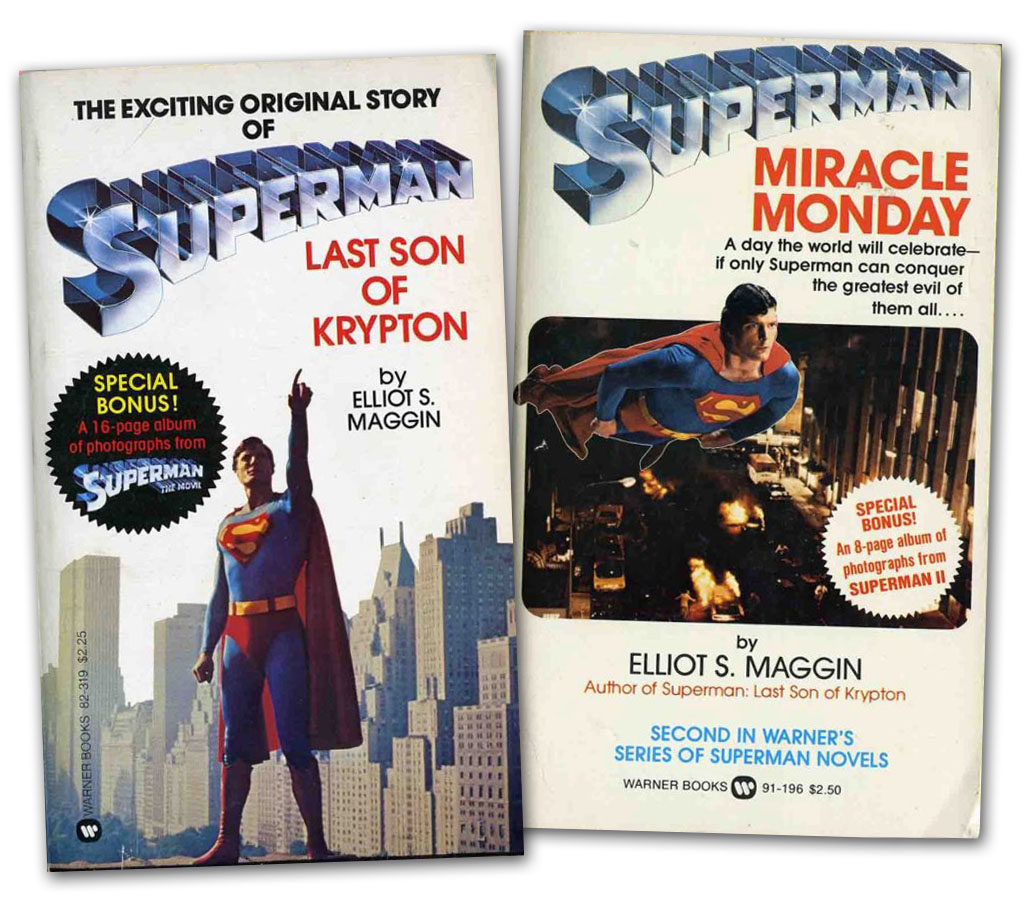
As the legend goes, Mario Puzo, the author of the bestselling novel The Godfather, as well as the screenplay adaptations that became The Godfather & The Godfather Part II, had a stipulation in his contract for writing the screenplays to the first two Superman movies that forbade anyone but himself from adapting them into novels. This apparently blocked Warner Brothers from commissioning any other authors to novelize the films, and Puzo himself never seemed interested in novelizing the stories. Thus, no adaptations were ever published for the first two films. All subsequent films in the franchise have received novelizations including Superman III and Superman IV: The Quest for Peace, as well as the modern films Superman Returns and Man of Steel. Though Puzo passed away in 1999 and thus never novelized those first two films, we’re curious if the contract stipulated a timeframe or if there was a mortality clause for the adaptations. We’d still love to see the movies turned into books as there is a lot of material in the screenplays that never made it into most cuts of the film.
As an side note of interest, part of the boom in movie to book novelizations stems from Puzo himself. After the success of Francis Ford Coppola’s film adaptation of The Godfather and Steven Spielberg’s adaptation of Peter Benchly’s Jaws, filmmakers and studios gloomed onto a theory that audiences felt movies based on books had more merit. Thus, novelizations became a very popular way for studios to both advertise their films and spread the good will of having a book on shelves that might make casual readers think that the related films had more “thought put into them”. In fact, in one such case, George Lucas, the writer and Director of Star Wars had a novel ghostwritten in his name (by none other than serial novelizationist Alan Dean Foster) in order to make it appear that the movie was actually based on a book he had written. Speaking of Jaws, the next novelization that never was is of an adaptation of a film from that franchise, Jaws III.
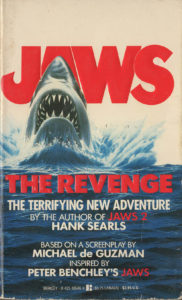
Again, while the first Spielberg directed movie was actually based on Peter Benchly’s bestselling novel, there were a series of novelizations that were released for sequels to the blockbuster movie. Before Jaws 2 was released in theaters in the summer of 1978, a novelization of the film appeared on store bookshelves in the spring of that year. Written by Hank Searls, Jaws 2 was certainly trying to cash in on the success of both the first film and book. The publishing house, Warner Books, had enough faith in the book’s success that they even issued ARCs (advanced reading copies) to book and film critics for review, a relative rarity in the novelization genre. Searls would return to the franchise almost a decade later with an adaptation of the ludicrous fourth film in the series, Jaws IV The Revenge. This begs the question, why did the studio and publisher decide to skip Jaws 3? Though not the most well-received of the sequels, Jaws 3 was heavily merchandised by the studio which released all sorts of tie-in products like commemorative 3-D glasses, Viewmaster reels, and a set of Topps Trading Cards. So why not a novelization?
Another set of novelizations that never were are for a handful of 80s teen films adaptations by the maestro of the genre, John Hughes. Whereas there were many novelizations based on Hughes’ movies, namely Pretty in Pink, Ferris Bueller’s Day Off and Some Kind of Wonderful, we never saw books based on films like Sixteen Candles, the Breakfast Club or Weird Science. Granted, the Pretty in Pink novelization by H. B. Gilmour was only published abroad in the United Kingdom, but the book is a fan favorite and rather special novelization in that it stays faithful to the original scripted ending of the film (which was subsequently changed during the making of the movie.) It’s a pretty common urge to ship the characters of Andie and Duckie, I mean it’s practically heartbreaking watching Jon Cryer as Duckie pour his heart out to Andie only for her to end up with super lame Blane. If you ever wanted the happy Duckie ending, it’s well worth picking up the novelization.
Not only were the three Hughes movies above adapted into novelizations, but there were also a bunch of other similar adaptation of teen films in the 80s including novels for Desperately Seeking Susan, Tuff Turf, Adventures in Babysitting, License to Drive and The Lost Boys. So again, why not books for Sixteen Candles, Breakfast Club, and Weird Science? If you’re a John Hughes super-fan you can even get your hands on adaptations of some of his other non-teen-centric films like Home Alone, Beethoven, or even National Lampoon’s Class Reunion!

